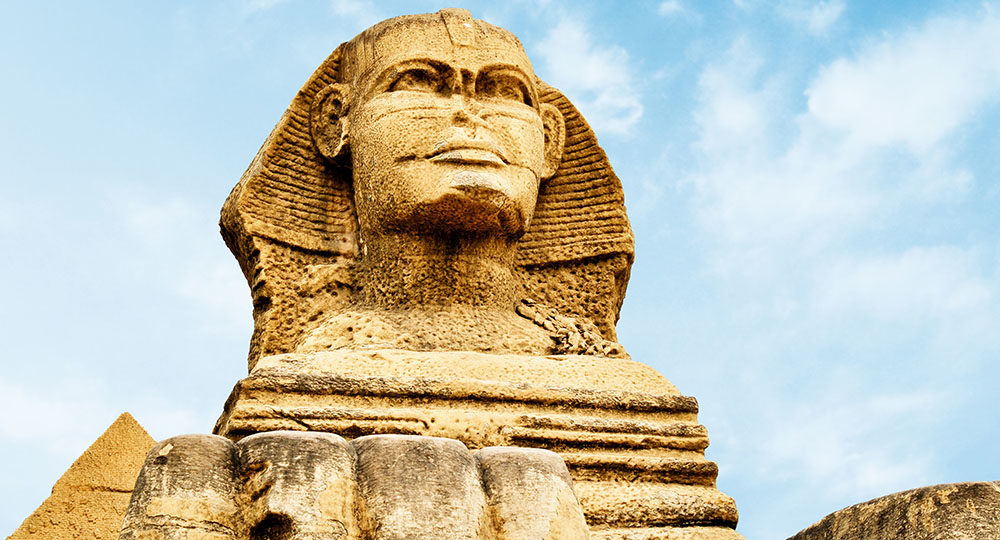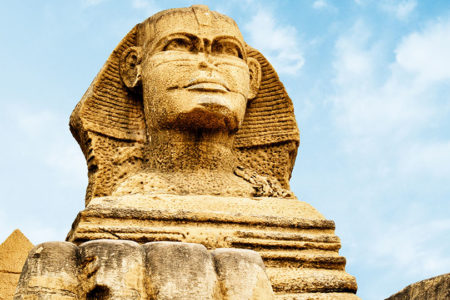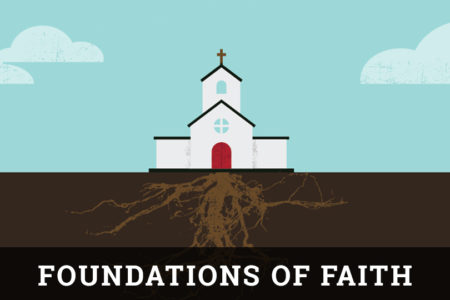Joseph: God’s Man for a Starving World
The life of Joseph presents some very important lessons for all who care to read the chapters in Genesis devoted to him. But there is one overriding factor in the story that should overwhelm the reader. It is found in the words of Joseph to his brethren.
“Now therefore be not grieved, nor angry with yourselves, that ye sold me here; for God did send me before you to preserve life” (Gen. 45:5). Everything that occurred in the tragedies and triumphs chronicled in the life of Joseph turns on the fact that, through all these events, God was working His divine will to bring about a specific purpose: the preservation of the nation and the supreme blessing, through the coming Messiah, for all mankind.
In the articles that follow, you will find specific observations on the personal life of Joseph, the tests he endured, and his phenomenal rise to power in Egypt. First, however, I want us to consider a few of the major connecting themes flowing from the time of Joseph and his family to our present day.
Joseph in the Wilderness
And Reuben said unto them, Shed no blood, but cast him into this pit that is in the wilderness, and lay no hand upon him; that he might rid him out of their hands, to deliver him to his father again (Gen. 37:22).
Joseph’s wilderness years began when he was cast into the pit by his brothers. It must have been incomprehensible to the young man that his own brothers would raise hands against him. After all, they were flesh and blood kin who were bound together by the strongest ties existing in the ancient world—the family. But hatred and envy can cut through the strongest of ties that bind, and this was certainly true in the experience of afflicted Joseph.
Modern Israel is just coming through a time of trauma equally as intense as Joseph’s must have been. A few days after the assassination of Prime Minister Rabin, I talked with an Israeli friend who had been with him three weeks before he was murdered. “We talked,” my friend said, “about security and the inflammatory rhetoric developing around the peace process. The prime minister could not believe that he was actually in any personal danger while he was with his own people.”
Israel’s deep and abiding anguish over the killing was intensified manyfold by the fact that a fellow Jew, a member of the family, was the perpetrator.
Have you noticed that when misunderstandings or disagreements come between two people, it always seems to be much worse when the offender is a member of the family? Indeed, among the most enduring hurts suffered at such times are those inflicted by the ones who are closest to you.
For Joseph—separated from his family, cut off from his land, and uncertain about whether he could ever return—the anguish must have been intense. Worse than this, however, was the length of time he was forced to live without an answer to his “Why is this happening to me?” His was not a captivity that lasted for months, or even for a few years; it was well over a decade before he learned the reason for his trials.
Jacob’s Years of Anguish
Joseph was not alone in his hour of need. He was, without a doubt, the child of his father Jacob’s heart.
“And Jacob tore his clothes, and put sackcloth upon his loins, and mourned for his son many days. And all his sons and all his daughters rose up to comfort him; but he refused to be comforted; and he said, For I will go down into sheol unto my son mourning. Thus his father wept for him” (Gen. 37:34–35).
For Jacob, nothing about Joseph’s death was consolable. His most gifted offspring, the boy with the most potential, was torn to bits by a wild animal. Or so he was led to believe. While Joseph, down in Egypt, sought answers for his long internment, Jacob suffered the interminable darkness of the void. Joseph was dead. There was, therefore, no flicker of hope that the situation could ever be changed.
I have for years been interested in the stories told to us by the markers found in old graveyards. We can learn a great deal from them.
I once visited a cemetery in Ohio, where I had been taken to view several unusual tombstones. One in particular caught my eye. It was of a teenaged boy, about the age of Joseph when he was sold into slavery, who had died in an accident. The carefully carved stone was fashioned in the form of a tree trunk that was cut off a few feet from the ground. What it represented was obvious: a life cut off before its time had come. I wondered how often dumbstruck parents had stood before the monument and asked God and one another how such a thing could have happened. Their emotions must have been much like poor Jacob’s during the dark years of being cut off from his son.
Israel as an Abomination
When Joseph invited his brothers to eat at his home in Egypt, a curious Egyptian custom was observed.
“And they set on [bread] for him by himself, and for them by themselves, and for the Egyptians, who did eat with him, by themselves: because the Egyptians might not eat bread with the Hebrews; for that is an abomination unto the Egyptians” (Gen. 43:32, italics added).
Joseph and his brothers were viewed as an abomination when it came to social relationships at a table. Furthermore, when Jacob and his family were brought to Egypt after Joseph was revealed to his brothers, they were, because of their trade, considered an abomination.
“That ye shall say, Thy servants’ trade hath been about cattle from our youth even until now, both we, and also our fathers; that ye may dwell in the land of Goshen; for every shepherd is an abomination unto the Egyptians” (Gen. 46:34, italics added).
Thus, in social matters, as well as in their profession as shepherds, the Israelites were considered an abomination to the Egyptians. This must have been a galling experience for Jacob and his sons. To be in but never quite of a country is especially difficult for sojourners from any land. It has been particularly true for Jewry. Ghettos and limits on where they could live, work, or socialize have been the lot of Jewish people throughout the years of the diaspora. Obviously, the perception of being unwanted is a heavy burden to carry.
The Foresight of God
Throughout the narrative, there is underlying and obvious evidence that, in spite of it all, God was at work in ways to be remembered as long as people read their Bibles.
“And Joseph’s master took him, and put him into the prison, a place where the king’s prisoners were bound: and he was there in the prison. But the Lord was with Joseph, and showed him mercy, and [the Lord] gave him favor in the sight of the keeper of the prison” (Gen. 39:20–21).
To be out of favor with the establishment—in Joseph’s case, with some members of his family, his Egyptian master, and Egypt’s legal system—was by all human measurement a sad situation indeed. But unseen by any human eye was the fact that God was working a higher purpose in Joseph’s life. In the end, the beneficiaries of his misfortune would be the members of his family who had sought to do him harm, Egypt, and the people of the known world. The central proposition at issue was the fact that many years down the road—in the ravages of drought and famine—there would be “bread in Egypt.” The instrument through which this would come about was the despised and displaced Joseph.
But Joseph’s wilderness experience, years of anguish, and being designated “an abomination” socially and by his family’s profession were not things to be upset about after all. God was working all things to the pleasure of His good will. It would not immediately be seen, but the Jewish boy in Pharaoh’s house was to be the savior of those about him.
Israel’s Isolation
There are, I believe, at least two great lessons here—lessons we must keep in mind when viewing Joseph’s years of misfortune. The first had to do with Israel. Israel’s enforced separation from the Egyptians allowed God to turn an unassimilated family into a great nation. Centuries later they marched out of Egypt on their way to the Promised Land, but not to a place only; they were moving toward their destiny. Through this rejected nation, the Messiah would come into the world. Therefore, God’s foresight and Joseph’s misfortune merged into His glory and our eternal benefit: The world would have a Savior; the Lord would have His name glorified.
Our Light Affliction
There is also something to be reaped by personal observation. Ours is an increasingly depressing world. Crimes so despicable and the social degradation that seems to ensure, short of a sweeping revival, the demise of the Western world bring with them a creeping sense of despair. Add to this the personal problems that can beat people down to a point where there seems to be no reason to hope for better days, and people can well reach spiritual rock bottom. Like poor Joseph serving in Pharaoh’s prison, even believers can be tempted to despair.
At such times, remember Joseph and rest in the reminder that “we know that all things work together for good to them that love God, to them who are the called according to his purpose” (Rom. 8:28). The times of trial and triumph in Joseph’s life say it loud and clear: There is hope, and God is competent to superintend His larger program and our comparably few days of “light affliction.” Let the Apostle Paul speak for us all.
“For our light affliction, which is but for a moment, worketh for us a far more exceeding and eternal weight of glory, While we look not at the things which are seen, but at the things which are not seen; for the things which are seen are temporal, but the things which are not seen are eternal” (2 Cor. 4:17–18).







